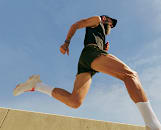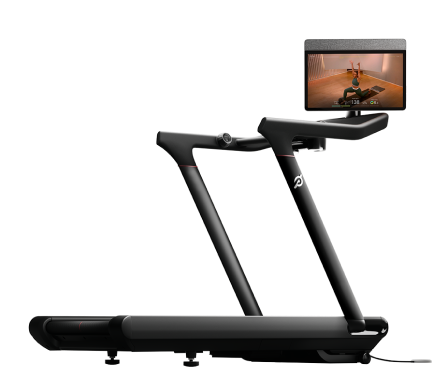
LeoPatrizi / E+ via Getty Images
How to Decide If You Should Exercise Before or After Work
There’s no bad time to move your body, but these tips can help you pick the ideal time for your routine.
By Jennifer Heimlich•
Exercising Before Work
Exercising After Work
How to Decide If You Should Exercise Before or After Work
The Takeaway
So you’ve decided to sign up for the Peloton App, join a yoga studio, or finally buy that snazzy pair of running shoes to jumpstart a new fitness routine. Your next step? Mapping out when you’re going to fit those workouts into your life so you stick with your training plan. Specifically, you might be trying to decide if you should exercise before or after work.
Discover more ways to reach your goals with Peloton
The truth is, you’ll get a ton out of moving your body whether you choose to hit the gym before or after work. But the logistics are a little different—which can end up affecting the exact health and fitness perks you end up reaping from each time window. We tapped a few experts from different fields to break it all down for us so that you can choose the strategy that’s going to work best for you.
Exercising Before Work
Hitting the gym before you hit the office is a classic move—for a few good reasons. But you’ve got to make sure this strategy truly works for you. Here’s what to keep in mind.
Pro: An Uplifted Mood
If you’re after the mood-boosting effects of fitness, exercising before work is the way to go, according to exercise physiologist Susie Reiner, PhD. “With an increase in blood circulating to the brain, an increase in circulating lactate, and an increase in endorphin and endocannabinoid activity, a workout can help you feel more elevated going into your day,” Reiner says.
She adds that it can also give you a sense of accomplishment that you can carry with you into your work hours.
Pro: It Can Be Easier to Stay Consistent
For those who work standard 9-to-5 hours, training before work allows you to take advantage of quieter mornings. It’s unlikely a business meeting or last-minute social event will pop up on your calendar at 5 or 6 AM, for example. “Our society doesn’t do more in the morning,” says clinical and sport psychologist Kristin Hoff, PsyD.
Reiner adds that decision fatigue is also less likely to get in the way if you simply exercise first thing after waking up.
Pro: Morning Workouts Might Feel Easier If You’re an Early Bird
One small 2013 study involving 20 male athletes who preferred morning workouts suggested that even when participants put in the exact same effort to get the same physical results, workouts felt harder in the evening than they did in the morning.
Con: It Can Potentially Add More Stress
If you’re not a morning person, or have obligations early in the day (like getting kids ready for school), exercising before work may feel like a struggle and could end up backfiring. “Adding the stress of a morning workout defeats the positive impact that workout can have, negatively impacting the autonomic nervous system—especially if it’s regularly cutting into sleep,” Reiner says.

Peloton App
Access thousands of classes with no equipment needed.
Exercising After Work
Early birds often get all the kudos for their prompt workouts. But there are plenty of people who get in fantastic fitness sessions after clocking out for the day. Here are the upsides and downsides to consider.
Pro: Evening Workouts Activate “Relax Mode”
With a phone in our pocket and our laptop waiting for us at home, sometimes it can feel like we’re always working. But exercising right after logging off can offer a mental reset that separates the working part of your day from personal time. “It can interrupt the rumination process,” Hoff says. Reiner adds that by stepping away from screens and allowing your mind to wander a bit as you run or row or lift weights, you can often end up less stressed.
A low-intensity session can be especially helpful: “Activities like yoga and stretching can reduce tension that’s built up over the day,” Reiner says.
Pro: No Strict Time Cutoff
When work is over, unless you have other responsibilities you need to attend to, you can take as much time with your workout as you feel like. Want to add in some extra miles or a bonus core strength class? No problem. In the mood for an extended cooldown or a soothing post-sweat meditation? You got it.
Pro: Potentially Lower Blood Pressure
Several studies indicate that doing aerobic exercise at night reduces your blood pressure more than if you were to do the same workout in the morning.
Con: Intense Workouts Before Bed Might Disrupt Sleep
Doing a super-tough training session at night could lead to more tossing and turning. A massive recent study using data from wearable fitness trackers found that performing a high-intensity workout within 4 hours of bedtime was linked with delayed sleep onset, shorter sleep duration, lower sleep quality, higher nighttime resting heart rate, and lower nighttime heart rate variability, Reiner says.
That’s because intense exercise puts your body in an “alarm state,” she explains, and if you don’t have enough time to wind down afterward, it’s hard to get your body to fully relax by bedtime. Not only could this leave you crankier in the morning, but she also points out that it can put a dent in your post-workout recovery.
However, she adds that not everyone sees this negative effect, so pay attention to your own body’s response before giving up your favorite evening HIIT class.
Con: Fueling Might Be Trickier
When you exercise before work, you can have a little snack of quick-digesting carbs (like half a banana) first to top off your glycogen levels before you get moving, then eat a real breakfast afterward, says registered dietitian Courtney Smith, RD. But after a traditional 9-to-5 day shift, fueling can be a little more complicated.
First, since it will likely have been a few hours since you’ve eaten lunch, you’ll want a snack before changing into your workout clothes. “Then it also might be a while before dinner, since you have to make it, so you might need a little snack after,” Smith says. “For me, that has been hard because I end up getting hungry and then snacking a lot while [making] dinner.”
How to Decide If You Should Exercise Before or After Work
When figuring out how to fit a fitness routine into your life, start by looking at your schedule. Find a pocket of time when you typically don’t have other responsibilities and you’re less likely to get waylaid by last-minute obstacles, whether that’s long days at the office or a “faulty” snooze button.
But pay attention to how your body—and mind—react to your workout: If it’s draining you rather than amping you up, it might make sense to reconsider your timing. Some of us naturally have more energy in the morning, and some of us are more pumped up to move at the end of our day, and Reiner suggests embracing that if your schedule allows.
If you want to work out with other people—whether that’s by joining a fitness class or local run club, or making a regular gym date with a friend—figure out when those opportunities are available. Hoff points out that the social aspect of fitness can go a really long way in helping us feel less isolated, so consider whether that’s a priority for you, and how to best make it happen.
It’s good to be somewhat flexible at times if your schedule is constantly changing. Maybe you hop on your Peloton Tread before work whenever you’ve got plans after work, but otherwise hit the gym at the end of the day. But consider aiming for some general consistency overall so you don’t end up regularly blowing off both your morning and evening windows to train.
“Working out at the same time every day (similar to sleep/wake and meal timing consistency) is emerging as potentially even more important than the time of day you work out,” Reiner says. You might especially want to take advantage of this if you’re training for a particular event, like a marathon or Hyrox competition: Research suggests that our bodies become adapted to performing at whatever time of day we typically train, so if you want to be able to give your all at, say, 8 AM, it may help to get your body used to exercising at that time.
The Takeaway
There are pros and cons of going to the gym before and after work. For example, exercising before work may leave you with a more elevated mood and help you stay consistent, but moving your body after work might give you more time to train and help you release tension from the day.
Still, although we know that our body’s circadian system has a major effect on our health and fitness performance, science hasn’t pinpointed one universally ideal time of day to train for the most optimal benefits, Reiner says. “Overall, the scientific consensus remains: Choose the time when you are most likely to work out consistently,” she says. That can depend on your personal schedule, and how your body reacts to movement at different times of the day.
Hoff adds that for our mental health, the best strategy of all is simply to get active and keep at it regularly—no matter whether we exercise before or after work. “Sometimes we’re looking for that perfect recipe: the perfect amount of activity, the perfect level of intensity, the perfect time of day,” Hoff says. But unless you’re an elite athlete, your best bet is just to do something that gets you moving, whenever you can.
This content is for informational and educational purposes only and does not constitute individualized advice. It is not intended to replace professional medical evaluation, diagnosis, or treatment. Seek the advice of your physician for questions you may have regarding your health or a medical condition. If you are having a medical emergency, call your physician or 911 immediately.
Our Products
Get our latest health stories straight to your inbox
Enter your email to get articles, expert-backed tips, and updates from Peloton sent to your inbox.
By providing your email address, you agree to receive marketing communications from Peloton.
For more about how we use your information, see our Privacy Policy.

















